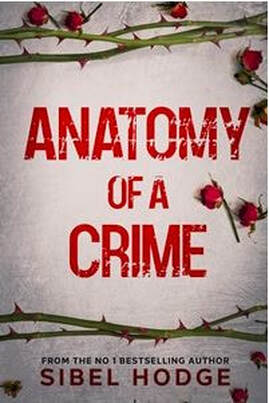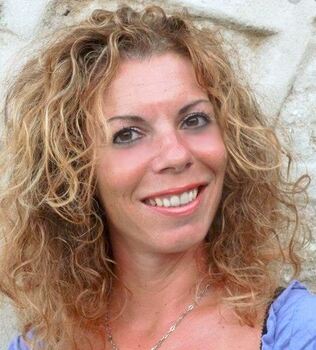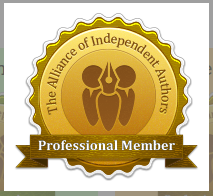|
This week I'm interviewing the lovely Sibel Hodge, a best-selling novelist who writes in a range of genres, including crime and thriller fiction. Welcome to my blog, Sibel! I’d like to know more about your latest novel. What can readers expect to encounter in its pages?  I love books told in an original way so I decided to write 'Anatomy of a Crime' in the format of a true crime podcast that I fell in love with listening to a few years ago. It's a twisty psychological-style thriller that leads readers on a dark, unpredictable journey... On the summer solstice in 2017, two girls walk into Blackleaf Forest. Only one comes out alive. Dubbed as the Sleeping Beauty Killer, and surrounded by rumours of witchcraft, Caris Kelly is sentenced to life in prison for murdering her best friend during a ritualistic thrill kill. Although Caris insists she is innocent, no one believes her. Then three years later, investigative journalist Lauren Taylor looks into the murder for her true crime podcast. She becomes convinced there's more to the flimsy witness testimony, sinister coincidences, and sensational press coverage and probes into the case. As prejudices are revealed, lies are uncovered, and secrets are blown wide open, a single question remains... is there really one truth about what happened that night? Or are there only different versions of the same story? Tell us about yourself and what you get up to when you’re not writing.When I'm not writing I usually spend a long time researching for the next novel! I also read 2-3 books a week. In my spare time you'll find me exercising, spending as much time in nature as I can, catching up with friends, and cooking. What have you written to date?  Novelist Sibel Hodge Novelist Sibel Hodge I've written ten thrillers, three romantic comedies, seven cozy mysteries, one contemporary romance, one young adult novel, one children's novel, two novellas, and three non-fiction, including two vegan cookbooks. I'm a hybrid author, published both traditionally and independently. When I first started writing I concentrated on romantic comedies and comedy/cozy mysteries that were a great fit for me at the time. But as my writing journey progressed, so did my life journey, and I wanted to start tackling darker subjects I could give a voice to as a writer that I felt weren't getting the mainstream attention they deserved. The first serious book I wrote in the crime genre was a novella about sex trafficking, and since then I've written multiple thrillers about many different types of trafficking, from exotic animals to organ trafficking, child and labour trafficking, and trafficking for ritual abuse. Do you have a special time to write? A writing routine? Do you work to an outline or plot? I'm very focused, so when I'm working on a first draft I get up about 6ish and then do some yoga and meditation before I start writing. I aim for 3000-5000 words per day. The first draft will usually take 3-4 weeks. As for plotting, I'm a total pantster! I know the underlying theme of a novel when I start writing, and most of my thrillers involve a lot of research that I have to condense into something readable, but I have no idea what's going to happen until I start writing. I let my characters lead the way. Where do your ideas come from? I like to write what I call true fiction. A lot of the novels I've written in the last ten years are inspired by real life events. I'm very passionate about animal and human rights and want to give a voice to darker subjects to raise awareness, particularly in tackling corruption, conspiracy, and women's issues. What book are you reading at present? 'Virus Mania' by Torsten Engelbrecht and Köhnlein Claus. Do you proofread/edit your own books or do you get someone else to do it?My hubby is my chief beta reader, which is great because he's not a reader so he'll point out a lot of things that I'm too close to see. If I'm indie publishing a book I'll send it out to a few more beta readers to get their helpful feedback. Then they all go to be professionally edited and proofread. Do you think the cover plays an important part of the buying process? Absolutely. And although I can't use a cover design program, I'll always have a clear idea in my head of how I want the cover to look so I can give as much visual instruction to the designer as possible. How do you select the names of your characters? I always get an idea in my head that fits a name to a personality type of the character I want. It's also a bonus to have the names of main characters as short as possible so it's less typing! What kind of research do you do? I do masses of research that sometimes spans years because I'm writing about real life events that I want to make as authentic as possible. I collate information from a huge range of sources from alternative news/mainstream media/investigative journalism/books/government agencies and reports/victims' accounts/documentaries. What is the first book to make you cry? 'Go Ask Alice' by Anonymous. I read it when I was about ten and it really stuck with me. What is the hardest/easiest thing about writing a book? The hardest? Collating and condensing the amount of research into something that weaves into the story seamlessly. The easiest? My books are very character driven, and I love getting inside my characters' heads. One of the things I find easy is expressing the psychology of their thoughts, actions, emotions, and personality. I think being an author is a lot like being an actor, but you have to wear all the characters' skins, not just one. Thanks, Sibel, for a great interview! You can find out moe about Sibel and her novels via her website, www.sibelhodge.com/
2 Comments
Leave a Reply. |
Categories
All
Subscribe to my blog!
Via Goodreads
|
Join my Special Readers' group and receive a free copy of 'Blackwater Lake'!
|
Privacy policy Website terms and conditions of use
Copyright Maggie James 2018 - current date. All rights reserved.
Copyright Maggie James 2018 - current date. All rights reserved.
 RSS Feed
RSS Feed
